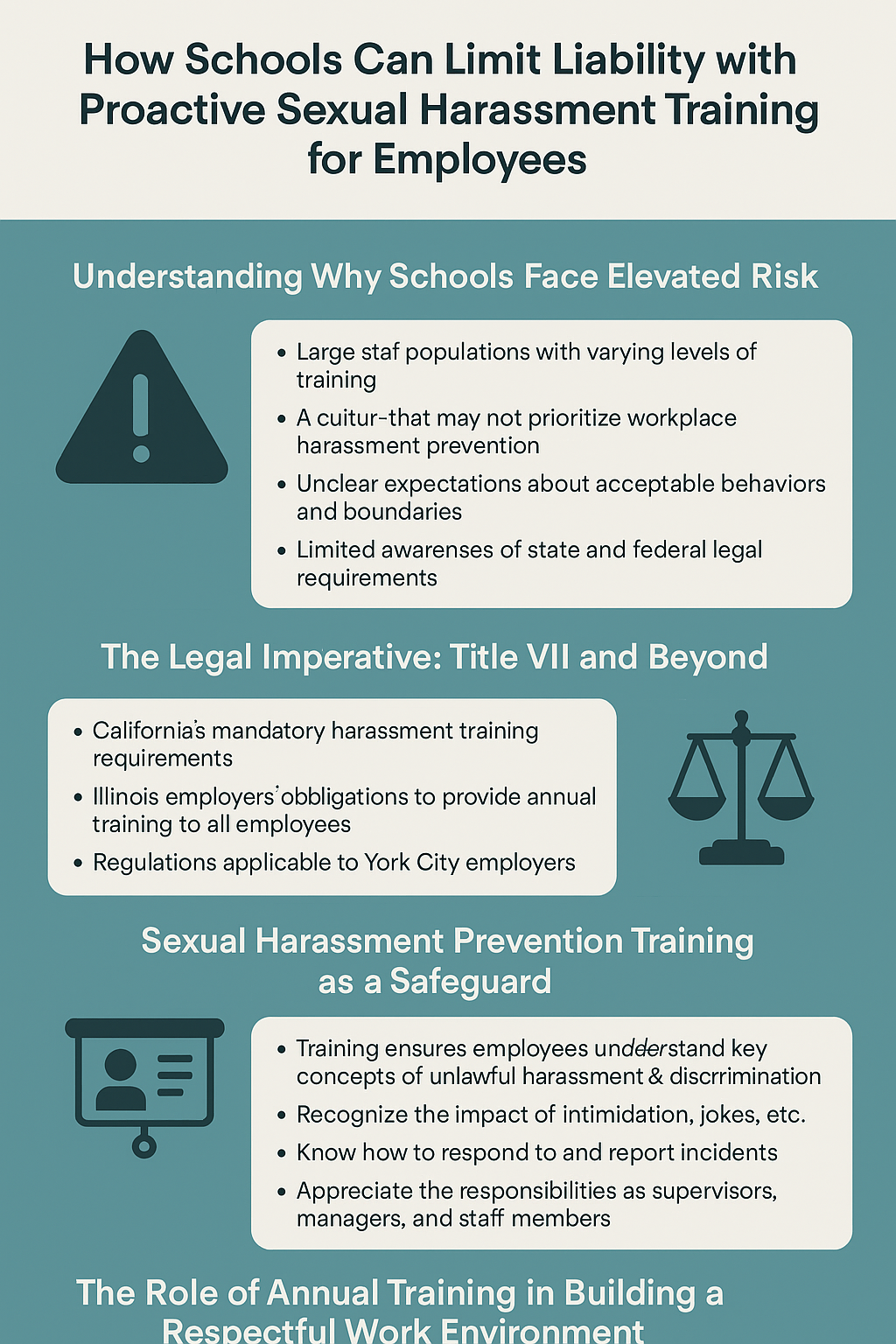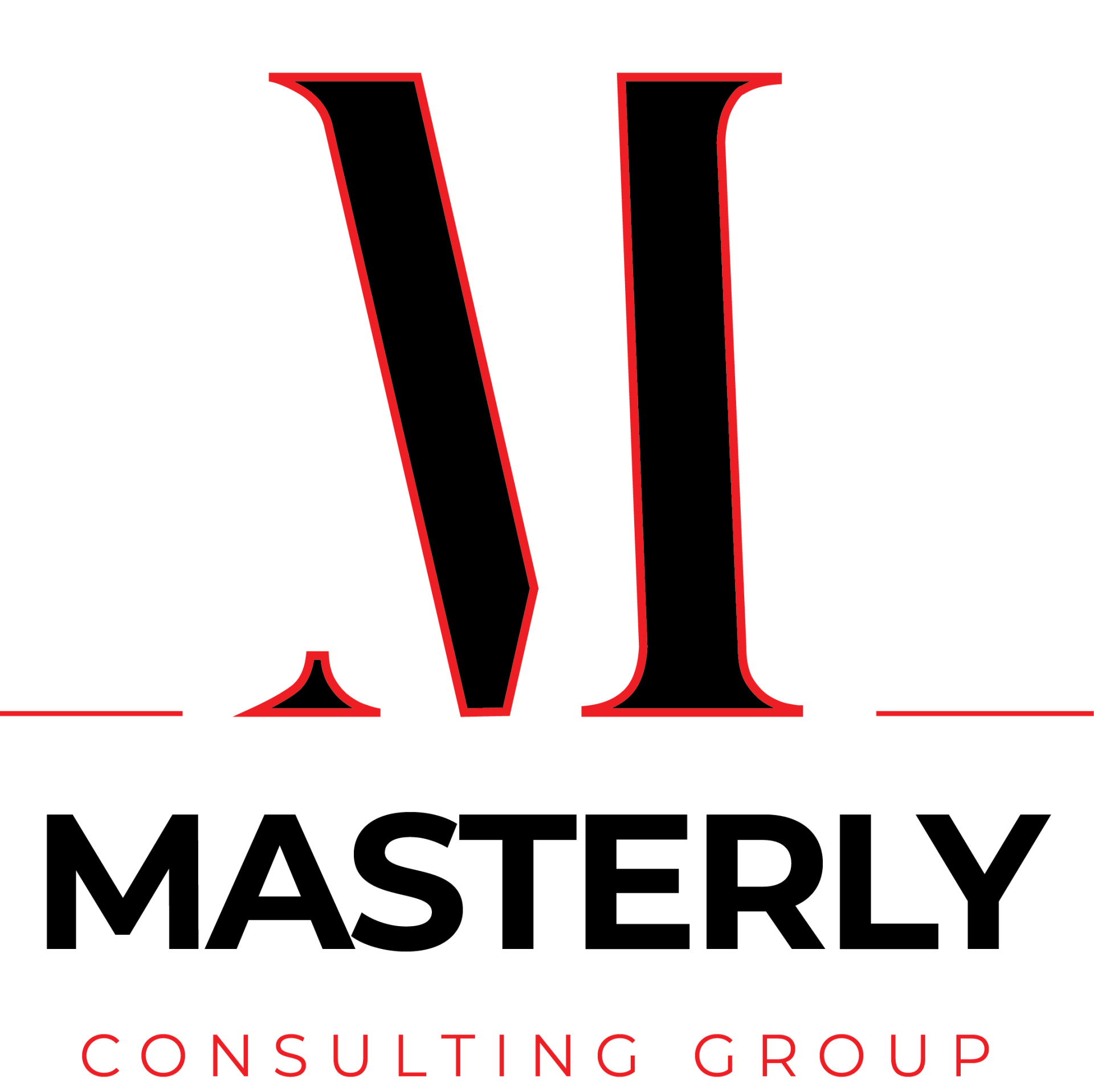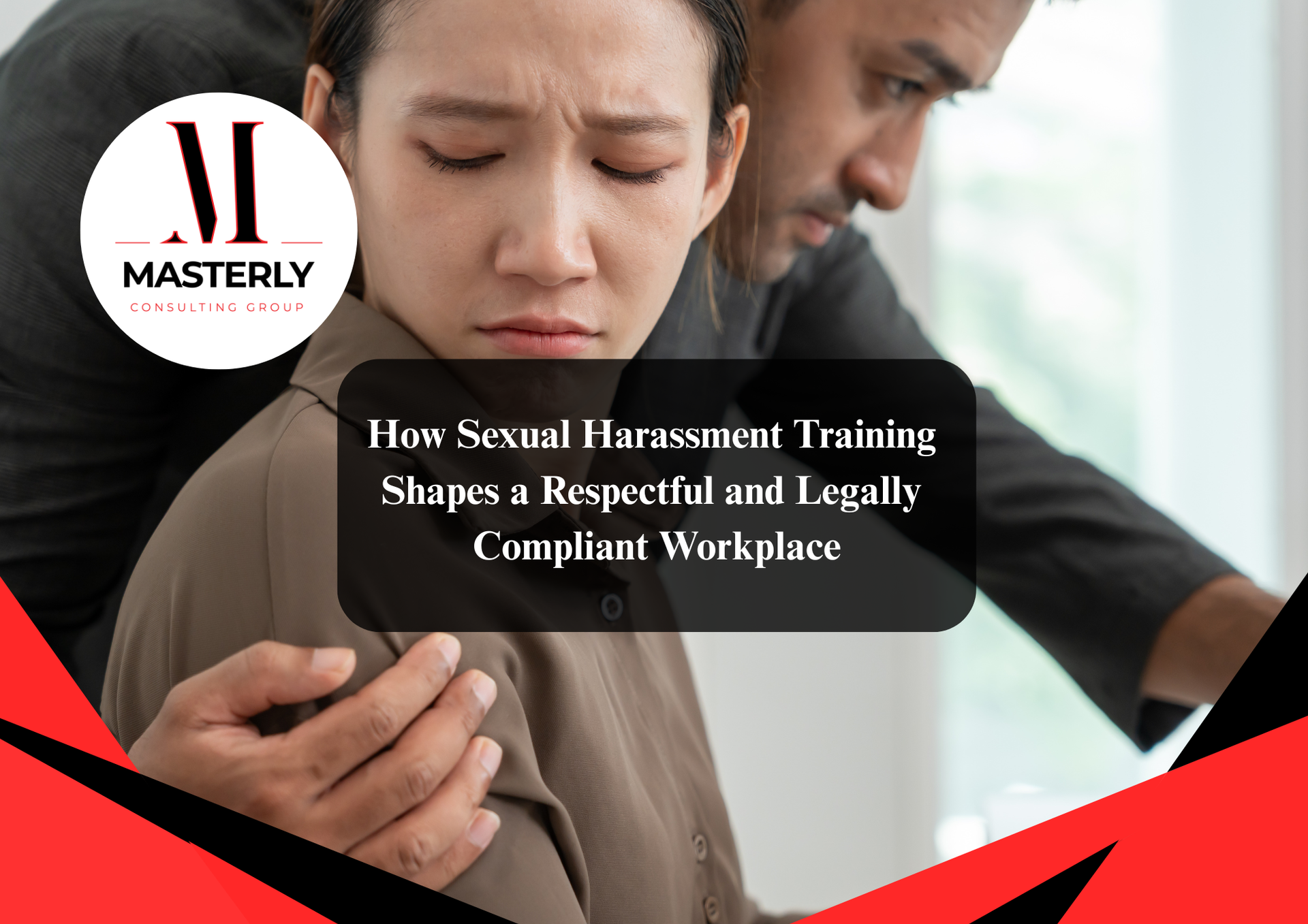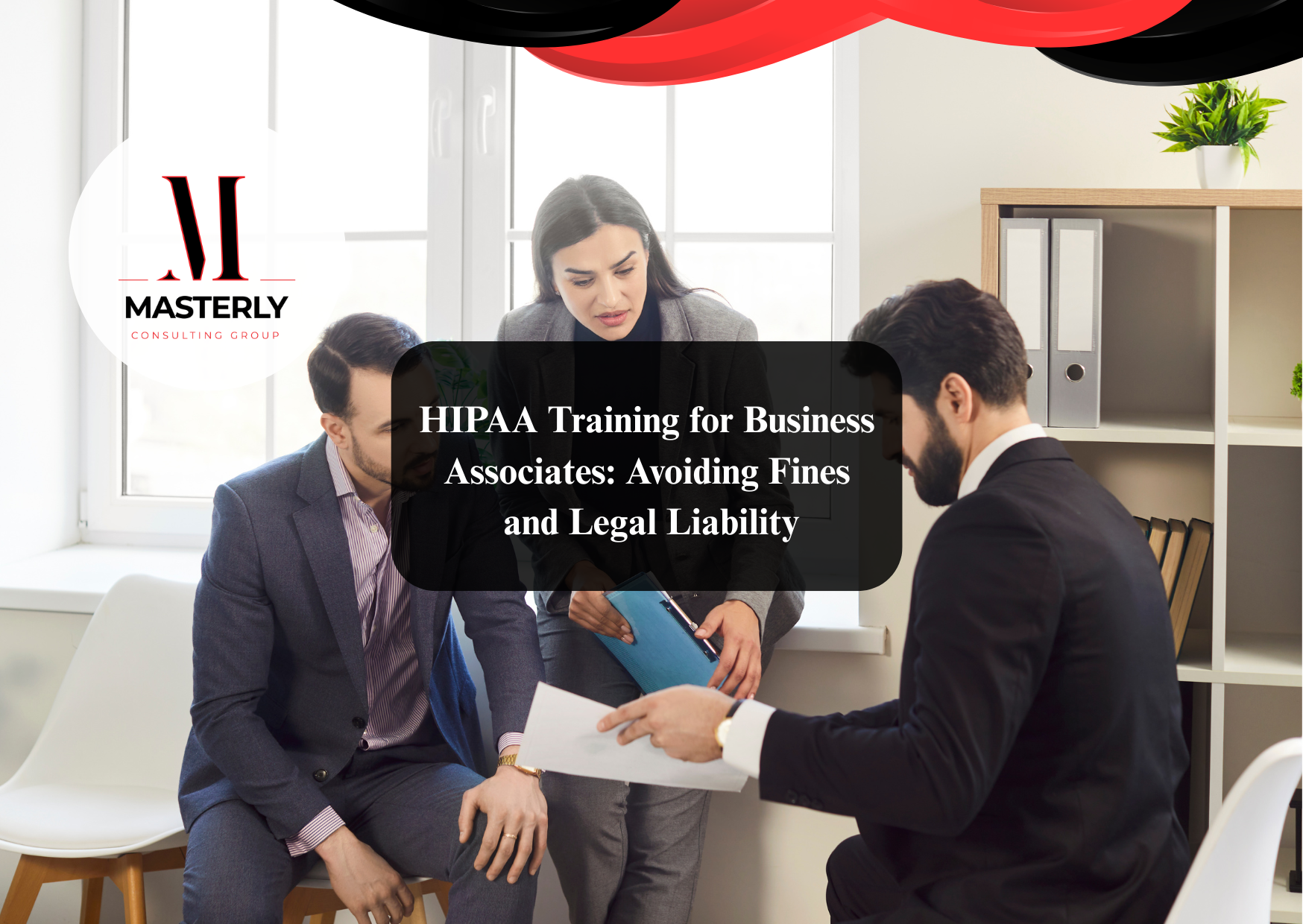How Schools Can Limit Liability with Proactive Sexual Harassment Training for Employees
Sexual harassment remains a significant legal and cultural challenge for schools and educational institutions. From national headlines to costly lawsuits, the risks of failing to prevent harassment are simply too high to ignore. Implementing comprehensive sexual harassment training for employees doesn’t just satisfy compliance requirements—it builds a respectful work environment and serves as a powerful shield against liability.
In this guide, you’ll discover how harassment prevention training and a clear sexual harassment prevention policy can help your school meet legal obligations, protect employees and students, and reinforce a culture of inclusion and accountability.
Understanding Why Schools Face Elevated Risk
Unlike many workplaces, schools often involve one or more employees supervising minors, interacting with parents, and collaborating in diverse teams. This environment increases the likelihood of misunderstandings and harassment incidents.
Key factors contributing to risk include:
- Large staff populations with varying levels of training
- A culture that may not prioritize workplace harassment prevention training
- Unclear expectations about acceptable behaviors and boundaries
- Limited awareness of state and federal legal requirements
Proactive sexual harassment prevention training is the most reliable way to reduce these exposures.
The Legal Imperative: Title VII and Beyond
Federal law, including Title VII of the Civil Rights Act, makes it clear that schools and other employers have a duty to prevent harassment and discrimination. Schools must also comply with additional state laws such as:
- California’s mandatory harassment training requirements
- Illinois employers’ obligations to provide annual training to all employees
- Regulations applicable to York City employers
Failing to train staff on harassment prevention, discrimination, and retaliation can trigger severe legal consequences.
Sexual Harassment Prevention Training as a Safeguard
When you invest in sexual harassment prevention training, you are doing more than teaching definitions—you are reducing legal and reputational risk. Training ensures employees:
- Understand key concepts of unlawful harassment and discrimination
- Recognize the impact of offensive jokes, intimidation, and other forms of misconduct
- Know how to respond to and report incidents appropriately
- Appreciate their responsibilities as supervisors, managers, and staff members
These programs empower schools to prevent harassment while demonstrating a commitment to compliance.
The Role of Annual Training in Building a Respectful Work Environment
Annual training has become a standard expectation in many states. It reinforces knowledge, reminds employees of policies, and helps prevent complacency.
By scheduling harassment training annually, your school sends a clear message: preventing harassment and promoting inclusion are top priorities.
Addressing Workplace Harassment Before It Escalates
One overlooked benefit of sexual harassment training is early intervention. When employees and supervisors can identify inappropriate conduct, they can stop it before it becomes a lawsuit.
Training gives your team the skills to:
- Respond to complaints without retaliation
- Document incidents accurately
- Engage in conflict resolution when appropriate
- Protect students, staff, and your school’s reputation
Proactive measures are always more effective—and less costly—than reactive ones.
Customizing Training Content for School Environments
Schools have unique needs that generic online training often overlooks. Effective training content should include:
- Scenarios involving students, parents, and community members
- Guidance for non supervisory employees as well as managers
- Special considerations for national origin and cultural sensitivity
- Emphasis on respectful workplace culture in educational settings
A tailored approach ensures every employee understands their role in preventing harassment.
The Benefits of Online Training for Busy School Staff
Online training offers flexible options for educators and support staff with varying schedules. Whether you deliver harassment prevention training in person or online, it should:
- Meet state requirements for compliance training
- Be accessible and easy to complete
- Include technical support for participants
- Allow tracking of completion dates and forms
Digital training platforms help schools maintain records and prove compliance if needed.
The Importance of Sexual Harassment Prevention Policies
Written policies are the backbone of a legally sound approach. Your sexual harassment prevention policy should:
- Define unacceptable behaviors clearly
- Explain how employees can report incidents
- Outline investigation procedures
- Detail consequences for violations
When combined with training, policies create a consistent framework for accountability and support.
Compliance Training: A Legal and Ethical Responsibility
Many school leaders believe that training is simply a box to check. In reality, compliance training is both a legal obligation and a vital component of a safe, inclusive environment.
Training should be:
- Regular and consistent
- Interactive and engaging
- Updated to reflect new laws and best practices
- Relevant to all employees, including new hires
Schools that commit to comprehensive compliance programs reduce their exposure to lawsuits and foster trust with employees and families.
Reinforcing Respectful Workplace Culture
Culture matters. When employees understand expectations for conduct and communication, it’s easier to maintain professionalism. Training supports this by:
- Encouraging open dialogue about boundaries and respect
- Teaching employees how to address workplace harassment
- Providing examples of acceptable behaviors
- Empowering staff to prevent harassment before it escalates
A positive workplace culture is your best defense against discrimination claims.
The Role of Managers and Supervisors in Prevention
Managers have unique responsibilities when it comes to preventing harassment. Training equips them to:
- Recognize early signs of misconduct
- Respond to complaints without delay
- Model appropriate conduct for their teams
- Protect the organization from claims of negligence
Empowering supervisors reduces risk and builds a more cohesive workplace.
Why Illinois Employers Must Prioritize Training
Illinois has some of the most detailed requirements for sexual harassment prevention. Illinois employers must provide training annually, covering:
- Definitions of sexual harassment
- Examples of conduct that violates the law
- Employee rights and reporting processes
- Penalties for noncompliance
Failing to comply can lead to fines and increased liability.
Creating a Training Program That Meets Multiple Standards
Because different states have different rules, your school must be sure its program:
- Satisfies federal law under Title VII
- Complies with California, Illinois, and other states where you operate
- Addresses local regulations for school districts
A comprehensive approach helps ensure you never fall behind on requirements.
The Role of Conflict Resolution in Harassment Prevention
Teaching conflict resolution skills is another way to reduce the chance of escalation. Training can cover:
- How to communicate concerns constructively
- Techniques to de-escalate tense situations
- When to involve HR or leadership
- The importance of impartial investigations
By resolving issues early, schools can prevent costly disputes.
Protecting New Employees with Early Education
New employees are often unaware of school policies. Incorporating harassment prevention training during onboarding:
- Sets expectations from the start date
- Demonstrates your commitment to a safe workplace
- Reduces the likelihood of unintentional violations
Early education builds a culture of respect from day one.
Supporting Inclusion and Diversity Through Training
Inclusion training complements harassment prevention by:
- Highlighting the value of diverse perspectives
- Teaching employees to avoid bias and discrimination
- Encouraging understanding across backgrounds
This approach reinforces a positive culture and reduces legal exposure.
Keeping Up With Evolving Laws and Best Practices
Laws and societal expectations change over time. Schools must:
- Update training materials regularly
- Review policies annually
- Stay informed about federal and state regulations
Ongoing updates ensure your organization remains compliant and prepared.
Tracking Training and Demonstrating Compliance
It’s not enough to conduct training—you must also track it. Good documentation includes:
- Dates of training completion
- Names of participants
- Copies of signed forms
- Records of additional information provided
Proper recordkeeping protects your school if allegations arise.

Choosing the Right Workplace Harassment Training Course for Your School
Selecting a workplace harassment training course is a critical step in protecting your school and demonstrating your commitment to a safe environment. The best programs combine engaging content with clear examples that help employees understand their rights and responsibilities. A well-designed course should address different forms of harassment, outline procedures for reporting incidents, and reinforce the importance of prevention. By investing in comprehensive workplace harassment training, you empower your staff to recognize inappropriate conduct and respond effectively before issues escalate. This proactive approach not only reduces liability but also strengthens your school’s culture of respect and accountability.
Combining Inclusion Training with Harassment Prevention for Lasting Impact
Integrating inclusion training into your overall strategy is one of the most effective ways to prevent harassment before it starts. When employees understand how to appreciate diverse perspectives and communicate respectfully, they are less likely to engage in conduct that leads to complaints or legal action. In addition to covering legal requirements and policies, high-quality programs provide additional information on cultural awareness, unconscious bias, and techniques to build stronger teams. This comprehensive approach not only reduces the risk of misconduct but also fosters a more positive and collaborative workplace where everyone feels valued.
The Power of Proactive Training to Limit Liability
Sexual harassment prevention training isn’t just about avoiding fines. It:
- Reduces the likelihood of lawsuits
- Builds a reputation for integrity
- Helps schools retain top talent
- Creates a respectful environment for employees and students
Proactive training is the most effective investment you can make to limit liability.
If you’re ready to strengthen your school’s safeguards and build a more respectful workplace, we’re here to guide you every step of the way.
Contact us today at (888) 209-4055 to schedule a free consultation about sexual harassment training for employees. Our experienced team can help you design effective programs, meet compliance requirements, and protect your organization from costly risks. The right training doesn’t just educate—it empowers your school to lead with confidence.








